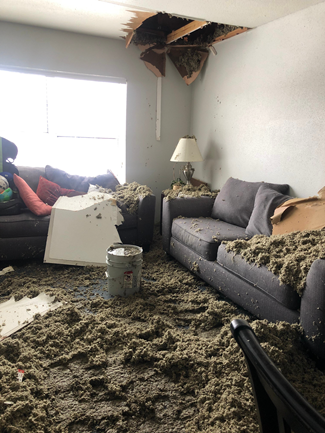Weather Disaster in Texas
The mid-February 2021 winter weather in Texas was a disaster. We mean that literally. Both Gov. Abbott and Pres. Biden have declared the severe winter storms beginning on February 11, 2021, a major natural disaster. Federal and state assistance is available to assist individuals in several Texas counties, including those in the North Texas area. Assistance may include grants for temporary housing and home repairs. Low-cost loans to cover uninsured property losses, and other programs to help individuals and business owners recover from the effects of the disaster. Apart from this, many individuals wonder what their legal rights may be under their leases and renters insurance.
Texas statute specifically addresses casualty losses
The Texas Property Code specifically addresses casualty losses as follows:
Sec. 92.054
Casualty Loss
(a) If a condition results from an insured casualty loss, such as fire, smoke, hail, explosion, or a similar cause, the period for repair does not begin until the landlord receives the insurance proceeds.
(b) If after a casualty loss the rental premises are as a practical matter totally unusable for residential purposes and if the casualty loss is not caused by the negligence or fault of the tenant, a member of the tenant’s family, or a guest or invitee of the tenant, either the landlord or the tenant may terminate the lease by giving written notice to the other any time before repairs are completed. If the lease is terminated, the tenant is entitled only to a pro rata refund of rent from the date the tenant moves out and to a refund of any security deposit otherwise required by law.
(c) If after a casualty loss the rental premises are partially unusable for residential purposes and if the casualty loss is not caused by the negligence or fault of the tenant, a member of the tenant’s family, or a guest or invitee of the tenant, the tenant is entitled to reduction in the rent in an amount proportionate to the extent the premises are unusable because of the casualty, but only on judgment of a county or district court. A landlord and tenant may agree otherwise in a written lease.
Damage to the Rental Premises
Ordinarily, damage to the rental premises itself resulting from a casualty loss must be repaired by the landlord, not the tenant. A tenant is normally required to report the damage to the landlord in writing, and the landlord must make a diligent effort to repair or remedy the condition as long as the tenant is not in default in paying rent. Most landlords carry property and casualty insurance covering such damage to the rental premises itself. Subsection (a) of the above statute clarifies that the time for the landlord to make such repairs does not start until the landlord actually receives the insurance proceeds from the landlord’s property and casualty insurance carrier.
If the damage to the rental premises is a result of the tenant’s own negligence, however, the tenant may be responsible to repair the damage. For example, the Texas Apartment Association’s form lease imposes certain specific requirements on tenants in the event of a freeze like Texans experienced:
24.4 Loss. Unless otherwise required by law, we’re not liable to any resident, guest, or occupant for personal injury or damage, loss of personal property, or loss of business or personal income, from any cause, including fire, smoke, rain, flood, water leaks, hail, ice, snow, lightning, wind, explosions, interruption of utilities, pipe leaks, theft, vandalism, and negligent or intentional acts of residents, occupants, or guests. We have no duty to remove any ice, sleet, or snow but may remove any amount with or without notice. Unless we instruct otherwise, during freezing weather you must for 24 hours a day: (A) keep the apartment heated to at least 50° Fahrenheit, (B) keep cabinet and closet doors open, and (C) drip hot- and cold-water faucets. You’ll be liable for any damage to our and others’ property caused by broken water pipes due to your violating these requirements.
The contractual requirements of the lease clarify what a reasonably prudent tenant is expected to do under such circumstances.
Obviously, some tenants lost electrical power during the winter storm and may have lacked the means to heat their apartment. It is likely that the loss of electrical power excuses the tenant from requirement (A).
Proving that requirements (B) and (C) were not met by a tenant may be difficult, but is not impossible. Property managers may question a tenant as to whether they took any action to protect their pipes and the premises during the freezing weather. A tenant may off-handedly admit that they did not, or may even indicate that they were away from the premises during the freeze. A property manager’s testimony that a tenant admitted to violating these requirements is admissible evidence and is not “hearsay” because it is a party admission.
Most tenants likely lack the financial ability to pay for major repairs to the premises. Personal liability coverage under a typical renter’s insurance policy may cover damage to the premises caused by a tenant. Some such policies expressly exclude damage to the rental premises itself.
Can Tenants Repair the Rental Property Themselves
Sometimes, a landlord doesn’t act as quickly as tenants may desire in repairing the rental property. Tenants may be tempted to repair the damage themselves. Residential leases often have language like the following in the Texas Apartment Association’s form lease:
25.2 Standards and Improvements. You must use customary diligence in maintaining the apartment and not damaging or littering the common areas. Unless authorized by law or by us in writing, you must not do any repairs, painting, wallpapering, carpeting, electrical changes, or otherwise alter our property. No holes or stickers are allowed inside or outside the apartment. Unless our rules state otherwise, we’ll permit a reasonable number of small nail holes for hanging pictures on sheetrock walls and grooves of wood-paneled walls.
Texas law does, however, authorize a tenant to make repairs and to deduct the cost of such repairs from future rent payments. Normally, a tenant’s deduction for the cost of such repairs is limited to the amount of one month’s rent or $500, whichever is greater.
Texas Property Code Sections 92.056-92.061 describes the conditions, procedures, and remedies for tenants to invoke their “repair and deduct” right under Texas law. They are detailed and fairly complicated. We do not recommend tenants exercising this right without the assistance of a competent attorney knowledgeable in this area of practice.
Damage to Tenant’s Personal Property
A landlord is not an insurer. Ordinarily, a landlord will not be held responsible for damage to a tenant’s personal property resulting from a casualty loss unless the tenant can show that the landlord was negligent or violated some legal duty owed to the tenant. A landlord’s property and casualty insurance policy normally does not protect the personal property of its tenant.
In addition, most leases contain express language relieving the landlord of legal responsibility for damage to a tenant’s personal property under all or certain specific circumstances. For example, the above quoted language of the form lease promulgated by the Texas Apartment Association specifically addresses events like the recent winter weather:
24.4 Loss. Unless otherwise required by law, we’re not liable to any resident, guest, or occupant for personal injury or damage, loss of personal property, or loss of business or personal income, from any cause, including fire, smoke, rain, flood, water leaks, hail, ice, snow, lightning, wind, explosions, interruption of utilities, pipe leaks, theft, vandalism, and negligent or intentional acts of residents, occupants, or guests. We have no duty to remove any ice, sleet, or snow but may remove any amount with or without notice. Unless we instruct otherwise, during freezing weather you must for 24 hours a day: (A) keep the apartment heated to at least 50° Fahrenheit, (B) keep cabinet and closet doors open, and (C) drip hot- and cold-water faucets. You’ll be liable for any damage to our and others’ property caused by broken water pipes due to your violating these requirements.
That is why every tenant ought to have renter’s insurance.
A renter’s insurance policy usually covers damage to a tenant’s personal property resulting from a casualty loss like burst pipes from a deep freeze. Such policies may provide either replacement cost or the actual value of the damaged property. A replacement cost policy will pay for the tenant to replace the damage article of property with the same, or a substantially similar equivalent, item at the current retail price. An actual value policy will reimburse the tenant for value of the item at the time of the casualty loss taking into consideration depreciation for the age and condition of the item at that time.
A replacement cost policy typically is more expensive than an actual value policy. Cost-sensitive tenants may have chosen an actual value policy. Sometimes, after a loss, an affected tenant will argue that he or she asked for or wanted a replacement cost policy and not an actual value policy. Because insurance agents are often compensated on a commission basis, this argument is usually not persuasive because such agents have a financial incentive to sell a tenant the more expensive replacement cost policy.
Certain categories of personal property—especially jewelry and electronics—usually have specific dollar limits under the typical renter’s policy. It is not uncommon for electronics to have a cumulative limit of $2,500. That means the policy will only pay a tenant up to that amount for all televisions, computers, game consoles, sound equipment, and portable devices. Tenants can, but rarely do, pay to increase the limit on their electronic devices.
Certain categories of personal property may not be covered under a typical renter’s insurance policy. Valuable antiques, collectibles, and artwork usually must be specifically listed and “scheduled” to be protected under renter’s insurance. This prevents an average tenant from claiming that the old furniture inherited from their grandmother was actually rare and expensive antiques.
Business personal property is also almost always excluded by renter’s insurance. This includes inventory, tools, equipment, machinery, and even work laptops. With the COVID-19 pandemic and many people working from home, this particular exclusion may impact certain tenants.
What about my rent?
If the rental premises are rendered as a practical matter totally unusable for residential purposes, either the tenant or the landlord may terminate the lease even though the term of the lease has not expired. A tenant is still responsible for paying rent up to the point that the tenant moves out, but is not responsible for paying rent thereafter. A tenant must exercise this right by giving the landlord written notice before repairs to the premises are completed. That precludes a tenant from using the casualty loss as an excuse to prematurely end the lease months later.
If the premises are only partially unusable—for example, a ceiling collapse from a burst pipe in one bedroom of a two bedroom apartment—then the tenant may be entitled to a pro rata reduction in the rent until repairs have been made. Typically, this would be calculated using the square footage of the unusable space in comparison to the overall size of the rental premises. This particular statutory provision, however, can and often is modified by the parties in their lease agreement.
For example, the form lease of the Texas Apartment Association states:
26.4 Casualty Loss and Equipment Repair. We’ll act with customary diligence to make repairs and reconnections, taking into consideration when casualty-insurance proceeds are received. Unless required by statute after a casualty loss, or during equipment repair, your rent will not abate in whole or in part. Air-conditioning problems are normally not emergencies. If air-conditioning or other equipment malfunctions, you must notify us as soon as possible on a business day.
This lease provision negates the statute concerning a pro rata rent reduction when only part of the premises are unusable.
If my landlord moves me to another unit, do I have to sign a new lease?
If a tenant’s unit has been damaged, the landlord may allow the tenant to move to a different rental unit owned by the same landlord. It is not uncommon for a landlord to ask for a new lease for the new unit. Under Texas Property Code § 92.062, the landlord may not require the tenant to execute a new lease for a term longer than the term remaining on the lease for the damaged rental unit. There is nothing that prevents the landlord and tenant from mutually agreeing to a new lease for a different or longer term. If a landlord provides a new lease for a new unit with a longer term, the tenant may accept the new unit while rejecting the longer term.






